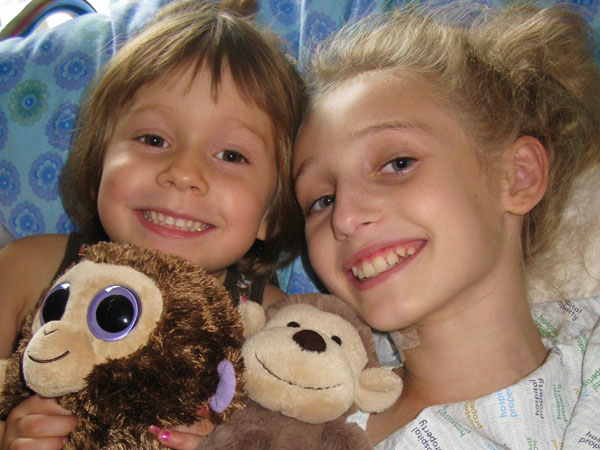Aimee Zeglinski-Spinney was running down the field during a soccer game for her competitive team when suddenly she collapsed.
It was obvious to the paramedics who rushed her to Children’s Hospital of Eastern Ontario (CHEO) in Ottawa, Ontario that her femur, the largest and strongest bone in the body, was broken. What wasn’t immediately evident was that the 11-year-old also had bone cancer.
“I couldn’t understand why I wasn’t able to stand or what had happened. I was in shock,” recalls Aimee, now 17. “My X-ray was mottled, something looked wrong beyond the fracture. The doctors and my parents were very worried.”
A week later – and just days before her twelfth birthday – Aimee was diagnosed with osteosarcoma, the same cancer that claimed Terry Fox. Her birthday gift that year was an unusual one: surgery for a port-a-cath in her neck and chest, a body cast, and intensive chemotherapy treatments.
Around 340 Canadians are diagnosed annually with bone cancers like osteosarcoma. Survival rates for those with localized osteosarcoma have improved since Terry’s diagnosis in 1977 and range from 60 to 80 per cent, but the prognosis remains grim for those with metastatic disease.
Aimee says she “was terrified” when she was diagnosed. “I worried that I would lose my leg, or worse, my life. I asked the doctors if I was going to die. Everyone reassured me that I would live, that I would fight it.”
And fight it she did. The preteen lost her hair, faced plummeting white-blood cell counts, frequent infections, excruciating mouth sores, sleepless nights, dizzy spells, body casts, daily needles, and blood transfusions. Then came a 20-hour surgery to remove the tumour and fix her leg.

Aimee (right) and her younger sister during treatment
“In Terry’s day, my surgery would have consisted of a full-leg amputation,” says Aimee. “However, in my operation, the surgical team managed to remove both the tumour and my broken femur, insert a donor bone, and then attach it to my knee and hip with tons of hardware.”
Then came five more months of grueling chemo followed by a complete remission.
Today Aimee is a healthy 17-year-old who resides with her parents and two younger siblings. She celebrated five-years cancer free in February 2016 and is considered cured – something she credits to Terry Fox.
“[Terry] made cancer a cause to care about, talk about, run for,” she says. “Myself and countless others are alive today in large part due to his journey and his relentless pursuit for cancer research and care.”
Her parents Scott Spinney and Joie Zeglinski agree.
“All the research that [the Terry Fox Foundation] did helped find a cure that helped cure her,” Scott says, noting that more cancer research is still needed for those with hard-to-treat forms of the disease.
Their daughter’s cancer was “a blessing and a curse,” mom Joie adds. The teen became incredibly resilient, as well as a cancer research advocate. But unintended effects from the chemotherapy treatments still linger.
“The usual side effects from the chemo Aimee received would be cardiac, kidney, hearing, and bone issues,” Joie says, noting that while doctors keep a close eye on the teen, Aimee is thriving. “It’s hard to put into words what it’s like to see her doing so well now – it’s certainly what we had hoped for.”
Aimee graduates from high school this spring, then she’ll begin studies in the biomedical program at the University of Ottawa. Her dream is to be a doctor - maybe even an oncologist - and give back to the community that gave her so much, including the Terry Fox Foundation.
Not that Aimee hasn’t made her mark already: The young woman has given speeches at numerous Terry Fox events, participated in the run nearly every year, fundraised, and will be a summer student in the laboratory of Dr. John Bell this summer. Dr. Bell is a senior scientist at the Ottawa Hospital Research Institute whose work in developing oncolytic viruses has been supported by TFF for more than a decade.
His lab is now developing targeted therapeutics to cure cancers while leaving healthy cells unharmed. Oncolytic viruses stimulate a patient’s own immune systems to destroy tumours, killing only cancerous cells and, potentially, avoiding toxic treatments like chemotherapy that patients are currently forced to undergo.
"Aimee is a bright, impressive and talented young woman who has fought her own personal battle with cancer and now wants to be involved in advancing research to help others,” says Dr. Bell. “We are very pleased and proud she is joining our team and helping us strive to fulfill Terry's dream of finding cures for cancer."
As for Aimee, the young woman is looking forward to a promising future.
“If I can survive the incomparably largest obstacle of my life, I can definitely survive all future challenges,” Aimee says.
“Having overcome such a daunting hurdle fuels my optimism for the future. I might be scarred from my hip to my ankle, but with the help of cancer research, I am still growing, growing stronger than ever.”